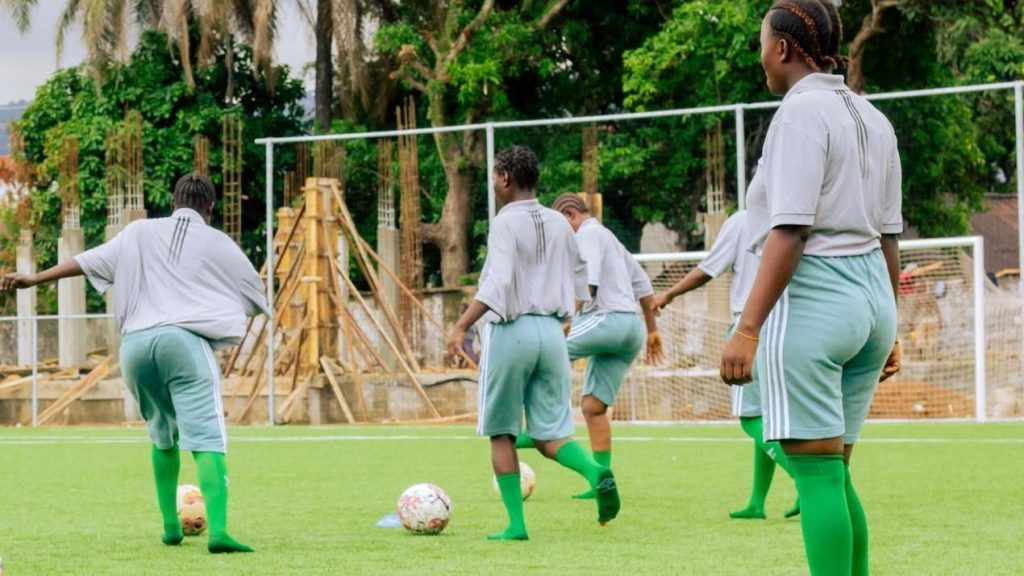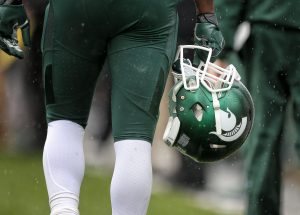
After spending almost four years in prison in Freetown, football has provided Marie with the chance of a fresh start in life.
While behind bars at a correctional facility in Sierra Leone’s capital, she enrolled in the first-ever coaching course for female inmates organised by the Confederation of African Football (Caf).
She was among 26 women and five police officers who took part in the Football for Reform initiative last year.
“Life in prison right now, the only thing you need is respect,” Marie, whose real name was withheld by the prison authorities, told the BBC World Service.
“When you [have] respect, [it is] like you are not in prison.”
The eight-day course equips inmates with a Caf-accredited D licence, a badge which enables them to coach football at grassroots level once they are released.
“It was more than the word great,” Marie said.
“I am proud to get my certificate. With this coaching certificate, I want to be able to get a job.”
About 80 women and their children are currently housed at the Freetown Female Correctional Centre according to AdvocAid, a non-governmental organisation in the West African country.
But it is not just prisoners in Sierra Leone who have benefited from the Caf course.
It has also been held in Ghana, is under way in Liberia and there are plans to extend the scheme to other parts of the continent.
Isha Johansen, former president of the Sierra Leone Football Association (SLFA), pioneered the project after a visit to the correctional facility in Freetown.
“I saw very young girls there, an inmate with a baby on her lap and another pregnant,” she told the BBC.
“90% of those inmates were in there because of poverty or petty crimes. They had no business being there.
“They are spending five, six or eight years doing nothing.
“I had to make a change. I was compelled to do something and football was a massive tool I had at my disposal.”
Rehabilitation through football

With few facilities at Freetown’s correctional centre, the first course was run on the Astroturf pitch at the SLFA academy in the city.
The country’s governing body also provided the inmates with equipment and jerseys.
However, Johansen said the prison will now be investing in its own football pitch “in the next few months”.
For those not keen on issuing instructions on the touchline, the Caf programme also offers other ways for inmates to get involved.
Some are now sewing jerseys and training bibs for clubs across the country.
“What I’d like to see is when these girls go back into society, they don’t end up back in prison,” Johansen said.
“When they come out, they’ve got skills. They can go to the football federation to look for a job and they can coach in schools.”
Meanwhile, inmates in Nsawam – the largest female prison in Ghana with a population of 115 – also took to the football pitch in February.
The facility, located just to the north of the capital Accra, houses just over half of the country’s female convicts.
Making positive social change

“Being in prison here is very complicated for us,” said one prisoner involved in the scheme in Nsawam.
“We are controlled on everything. It gives us a headache.
“But coaching is my passion, so when we heard about the course I was so happy to be part of it.
“We have learnt a lot of skills, like dribbling techniques.”
Former Ghana international Mercy Tagoe, who represented her country at the 1999 Women’s World Cup and has also coached the Black Queens, was among the instructors when the Caf course was run in Nsawam.
She stresses how it can help inmates back into society.
“They can do something with this license. Once they leave prison they can start with the grassroots within their local area,” Tagoe said.
“They go to prison to be reformed. So this course can help them move on with their lives.”
Back in Freetown, Johansen is working with Caf and world governing body Fifa to see how the scheme can be implemented in other African countries – but also further afield in Asia and South America.
Football, she believes, has the power the change the lives of young women in similar circumstances across the globe.
“It’s about using football for positive social change,” Johansen said.
“Football is so much more than just 90 minutes on the pitch. This is an example of that.”
 Image source, Isha Johansen
Image source, Isha Johansen-
29 minutes ago
After spending almost four years in prison in Freetown, football has provided Marie with the chance of a fresh start in life.
While behind bars at a correctional facility in Sierra Leone’s capital, she enrolled in the first-ever coaching course for female inmates organised by the Confederation of African Football (Caf).
She was among 26 women and five police officers who took part in the Football for Reform initiative last year.
“Life in prison right now, the only thing you need is respect,” Marie, whose real name was withheld by the prison authorities, told the BBC World Service.
“When you [have] respect, [it is] like you are not in prison.”
The eight-day course equips inmates with a Caf-accredited D licence, a badge which enables them to coach football at grassroots level once they are released.
“It was more than the word great,” Marie said.
“I am proud to get my certificate. With this coaching certificate, I want to be able to get a job.”
About 80 women and their children are currently housed at the Freetown Female Correctional Centre according to AdvocAid, a non-governmental organisation in the West African country.
But it is not just prisoners in Sierra Leone who have benefited from the Caf course.
It has also been held in Ghana, is under way in Liberia and there are plans to extend the scheme to other parts of the continent.
Isha Johansen, former president of the Sierra Leone Football Association (SLFA), pioneered the project after a visit to the correctional facility in Freetown.
“I saw very young girls there, an inmate with a baby on her lap and another pregnant,” she told the BBC.
“90% of those inmates were in there because of poverty or petty crimes. They had no business being there.
“They are spending five, six or eight years doing nothing.
“I had to make a change. I was compelled to do something and football was a massive tool I had at my disposal.”
Rehabilitation through football
 Image source, Isha Johansen
Image source, Isha JohansenWith few facilities at Freetown’s correctional centre, the first course was run on the Astroturf pitch at the SLFA academy in the city.
The country’s governing body also provided the inmates with equipment and jerseys.
However, Johansen said the prison will now be investing in its own football pitch “in the next few months”.
For those not keen on issuing instructions on the touchline, the Caf programme also offers other ways for inmates to get involved.
Some are now sewing jerseys and training bibs for clubs across the country.
“What I’d like to see is when these girls go back into society, they don’t end up back in prison,” Johansen said.
“When they come out, they’ve got skills. They can go to the football federation to look for a job and they can coach in schools.”
Meanwhile, inmates in Nsawam – the largest female prison in Ghana with a population of 115 – also took to the football pitch in February.
The facility, located just to the north of the capital Accra, houses just over half of the country’s female convicts.
Making positive social change
 Image source, Isha Johansen
Image source, Isha Johansen“Being in prison here is very complicated for us,” said one prisoner involved in the scheme in Nsawam.
“We are controlled on everything. It gives us a headache.
“But coaching is my passion, so when we heard about the course I was so happy to be part of it.
“We have learnt a lot of skills, like dribbling techniques.”
Former Ghana international Mercy Tagoe, who represented her country at the 1999 Women’s World Cup and has also coached the Black Queens, was among the instructors when the Caf course was run in Nsawam.
She stresses how it can help inmates back into society.
“They can do something with this license. Once they leave prison they can start with the grassroots within their local area,” Tagoe said.
“They go to prison to be reformed. So this course can help them move on with their lives.”
Back in Freetown, Johansen is working with Caf and world governing body Fifa to see how the scheme can be implemented in other African countries – but also further afield in Asia and South America.
Football, she believes, has the power the change the lives of young women in similar circumstances across the globe.
“It’s about using football for positive social change,” Johansen said.
“Football is so much more than just 90 minutes on the pitch. This is an example of that.”
Related topics









